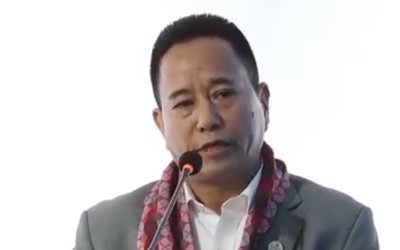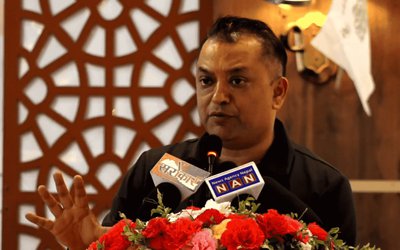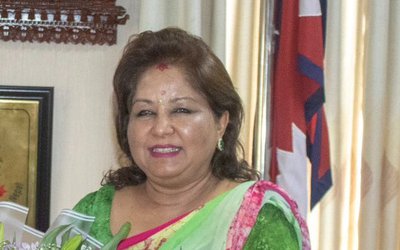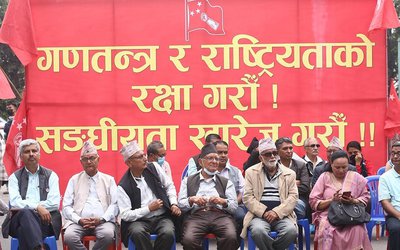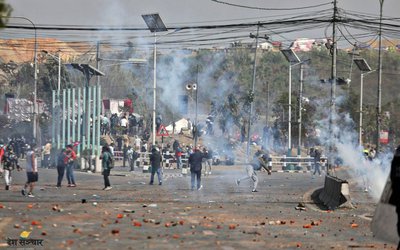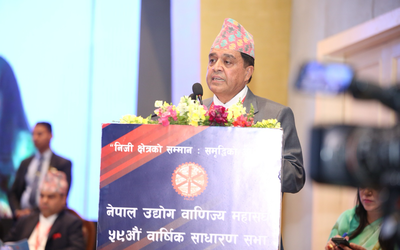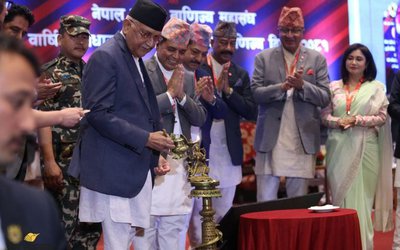
At a time when Nepal’s far-western and mid-western regions are facing severe food crisis and a major food security threat, Practical Action, with support from European Union, has launched a new project to boost the agricultural production there.
The cost of BICAS (Building Inclusive and Sustainable Growth Capacity of CSOs in Agriculture and Forest Sectors) project is 2 million Euro. As part of the cooperation, Practical Action is the project implementing partner.
As Nepal is a predominantly agrarian country with a very diverse nature where mountains and hilly areas cover 64% of the territory, this also brings with it a unique set of challenges.
BICAS operates in five districts, Kalikot, Mugu, Jumla, Bajura and Bajhang. These districts are amongst those with the highest level of poverty with average 46 per cent population living below the national poverty line.
Increasing food insecurity in the region has resulted in high migration of around 25 per cent of the male population. The situation has further worsened due to the increased climate change impacts, mainly on existing cropping system and productivity. Livelihood of people in the Karnali region with below 2 per cent arable land mainly depends on agriculture, Non-Timber Forest Products (NTFPs) collection, wage labour and remittance.
As many challenges persist, BICAS aims to stimulate inclusive and sustainable growth through better livelihood opportunities. The project will enhance economic infrastructure by promotion of five Gravity Goods Ropeways (GGR), promotion of irrigation infrastructure, including 5 irrigation canals, 10 multi-use water systems, 25 pond irrigation canals and other micro-irrigation technologies such as thai jars, sprinkler and drip, processing infrastructure and market infrastructure.
“Practical Action’s BICAS project is being implemented in chronically food insecure regions of Nepal. The project can complement Government of Nepal’s agenda of right to food as peoples’ fundamental right by enabling CSOs towards that end; specially at a time when the government is prioritizing development of far west and other food insecure regions of the nation,” said Chief Guest Vijaya Bahadhur Kunwar, Member of National Planning Commission (NPC).
“The Karnali region is amongst the most stunning, with an amazing natural beauty. At the same time living conditions there are very harsh for many. The EU is looking forward that BICAS demonstrates practical ways to enhance livelihood opportunities in this part of Nepal,” said Andreas Roettger, Head of Cooperation, EU Delegation to Nepal.
Chaired by Achyut Luitel, South Asia Regional Director of Practical Action, Narayan Prasad Kafle, Joint Secretary, Ministry of Women, Children and Social Welfare, Dr. Bamshi Sharma, Joint Secretary, Ministry of Livestock Development and Dr. Yubak Dhoj GC, Director General, Department of Agriculture Development also highlighted the importance of program.
Nepal's vision and aspiration to develop and to reach middle income status by 2030 can only be achieved with a specific focus on rural areas, including the disadvantaged remote places. Rural development is a focal area of EU-Nepal cooperation and it includes initiatives to foster cohesion, i.e. helping those areas which are lagging behind.
The BICAS project initiated in the five districts in February 2016 and will continue until January 2019. The project co-funded by the European Union aims to enhance Civil Society Organisations CSOs’ contribution to governance and development of agriculture and forest based economic sectors in Nepal. Out of €2,000,681 total project cost, the EU contribution is € 1,500,000. Specifically, the project focuses on building the capacity of 45 CSOs to promote inclusive and sustainable growth and increase income of 7000 HHs from agriculture and forest based enterprises in project districts.
“BICAS is designed to build institutional capacity of the local non-state actors for inclusive and sustainable growth. BICAS’s interventions aim to bring about increased access of rural population to resilient, light and innovative infrastructure for economic activities, strengthened inclusive and pro-poor value chain of rural agro and forest based enterprises and NTFP, developed technical and entrepreneurial capacity and disaster risk reduction skills of local farmers, Improved capacity of CSOs in development and promotion of disaster resilient infrastructures, new income generating activities, and climate smart agricultural practices and enabled environment for CSOs to constructively engage with local governments and other development actors for better governance,” said Sujan Piya, Head of Agriculture, Food Security and Markets, Practical Action,
BICAS also embeds successful experiences from the EU funded food security project, POSAN Food Security, which is underway in Bajhang, Bajura, Doti and Achham.

Keshab Poudel
Poudel is the editor of New Spotlight Magazine.
- POLITICAL VIOLENCE: Culture of Impunity
- Apr 11, 2025
- PM OLI MEETS PM MODI: No Progress
- Apr 09, 2025
- PM OLI’S THAILAND VISIT: Flip Flop
- Apr 08, 2025
- FM Dr. Deuba’s India Visit: Mission Aborted
- Mar 26, 2025
- AMBASSADOR MAEDA TORU: Warm Regards
- Mar 24, 2025
